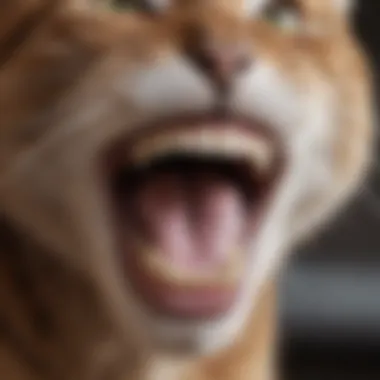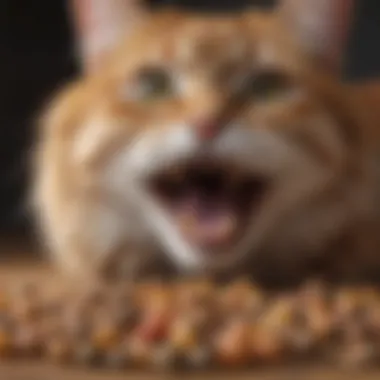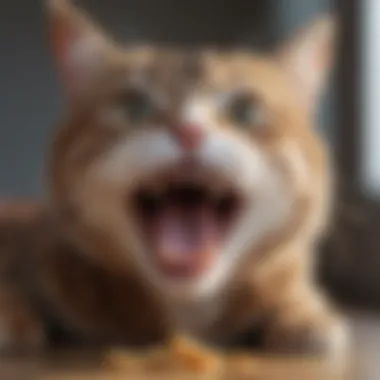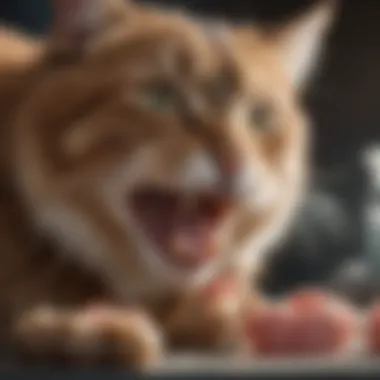Optimal Nutrition for Cat Dental Health: A Comprehensive Guide


Intro
The health of a cat’s teeth may not seem like a priority, yet it plays a vital role in their overall well-being. Neglecting dental care can lead to severe health issues throughout a cat's life. This section outlines the importance of nutrition in promoting dental health and how proper pet care routines can help maintain a cat's oral hygiene. By understanding the connection between diet and dental wellness, pet owners can make informed decisions that benefit their feline companions.
Pet Care and Grooming
Importance of Regular Care
Establishing a routine for dental hygiene is essential. Regular care not only prevents plaque build-up but also reduces the risk of gum disease. Brushing a cat's teeth can help in this regard. Although cats can be somewhat resistant to this practice, introducing it gradually can lead to positive results. Additionally, regular check-ups with a veterinarian are crucial for monitoring dental health.
Tools and Products Recommendations
When it comes to dental care, specific products can significantly enhance a cat's oral hygiene. Using pet toothpaste instead of human toothpaste is imperative, as the latter can be toxic to cats. Here are some recommended tools:
- Cat toothbrushes: These often have softer bristles specific for feline teeth.
- Dental treats: Certain brands like Greenies help in reducing tartar.
- Water additives: These can provide an extra layer of protection against plaque and bacteria.
- Dental chews: Some chewable snacks are designed to keep teeth clean.
Seasonal Care Tips
Maintaining dental health can vary with the seasons. During colder months, for instance, a cat’s diet may lean towards indoor options. It is important to select foods that are beneficial for their teeth regardless of the season; canned food can sometimes promote plaque if used excessively. Fresh water and ensuring adequate hydration help maintain gum health and should be a year-round focus.
Health and Nutrition
Understanding Pet Nutrition
Nutrition plays a critical role in a cat's dental health. It is essential to understand the various dietary components that contribute positively to their teeth. Cats are obligate carnivores; therefore, their diets should be rich in proteins and have controlled carbohydrate levels.
A balanced diet can significantly reduce the risk of dental diseases.
Preventive Care and Regular Check-Ups
Preventive veterinary care is often overlooked. Regular check-ups allow professionals to assess a cat's dental health comprehensively. Vets can provide cleanings and identify potential problems early on. This proactive approach is often much less costly than treating advanced dental issues.
Resources and Community Engagement
Recommended Books and Websites
For additional information on cat dental health and nutrition, there are resources available. Websites like Wikipedia and Britannica provide valuable insights. Reading expert-authored books can offer comprehensive guides.
Forums and Groups for Pet Owners
Online forums, such as reddit.com, serve as platforms where cat owners can share experiences and tips related to dental health. Engaging in communities allows for exchanging knowledge and learning from diverse experiences.
Pet owners have a crucial role in maintaining their cats’ dental health through proper nutrition and care. By incorporating these practices, the journey towards optimal dental wellness can be achieved.
Understanding Cat Dental Health
Maintaining proper dental health in cats is an aspect of pet care that often gets overlooked. While accolades for good grooming routines exist, dental hygiene fails to get its due recognition despite its critical role in overall cat health. Poor dental hygiene can lead to various health problems, including infections and chronic pain. Understanding this is essential for all cat owners.
The Importance of Dental Hygiene in Cats
Dental hygiene is a cornerstone of a cat's overall well-being. Cats are prone to dental diseases such as periodontal disease, which if left unchecked, may cause severe pain and other systemic issues. Without proper dental care, cats can develop plaque and tartar buildup that leads to gum disease. In a serious scenario, these conditions might even spread, affecting vital organs.
Moreover, maintaining good oral hygiene can prolong a cat's life. Regular dental care helps to prevent unnecessary vet visits by addressing potential issues before they escalate. Not only does this mean fewer health concerns for your cat, but it also translates into lower costs for pet owners in the long run.


Common Dental Issues Faced by Cats
Cats face several dental issues that can seriously disrupt their health. The following are some of the most common problems:
- Periodontal Disease: This is an infection of the tissues that surround the teeth. It is often a result of plaque buildup, leading to gum inflammation.
- Tooth Resorption: This painful condition involves the breakdown of tooth structure and can lead to tooth loss.
- Stomatitis: This is a painful inflammation of the mouth and can be triggered by dental issues.
- Plaque and Tartar Buildup: Neglecting dental hygiene results in ongoing buildup that can harbor bacteria and lead to other complications.
Awareness of these issues allows cat owners to take proactive steps in preventing them.
Signs of Dental Problems in Cats
Recognizing the signs of dental problems early can make all the difference in treatment. It's crucial for cat owners to observe their pets closely. Signs that may indicate dental issues include:
- Bad Breath: A noticeable odor may suggest dental problems.
- Difficulty Eating: If a cat struggles to chew or shows reluctance to eat, this may signal pain.
- Swollen Gums: Inflammation may accompany gum disease.
- Visible Plaque or Tartar: Discolored teeth can be an obvious red flag.
- Excessive Drooling: This can occur due to oral discomfort.
It is essential for cat owners to schedule regular check-ups with their veterinarian to ensure early detection and management of dental issues.
These signs are often subtle, requiring careful observation and possible veterinary consultation. Ensuring a proactive approach to dental health can help maintain a cat’s overall health and well-being.
Diet's Role in Cat Dental Health
The connection between a cat's diet and its dental health is often underappreciated. Proper nutrition can significantly impact the condition of your cat's teeth and gums. Understanding this relationship can guide pet owners to make informed choices that not only support overall health but also reduce the risk of dental diseases.
How Food Affects Teeth
Food plays a critical role in maintaining dental health. The texture, consistency, and ingredients of a cat's diet can determine how effectively it cleans the teeth while being consumed.
- Dry food often provides a mechanical cleaning action when chewed. The crunching can help remove plaque and reduce tartar buildup. However, not all dry food offers the same benefits; it is important to select brands that are specifically formulated to support dental health.
- Wet food, on the other hand, typically lacks this abrasive function. While it is beneficial for hydration and offers a range of nutrients, it does not contribute to cleaning the teeth during consumption. Consequently, relying solely on wet food can increase the likelihood of dental issues.
The quality of ingredients is also vital. Foods high in carbohydrates can exacerbate dental problems as they promote plaque accumulation. Conversely, high-protein diets, which are more aligned with a cat's natural dietary needs, may reduce these risks and better support dental hygiene.
Dental health is not just about brushing; it begins with the food you choose for your cat.
Nutritional Components Essential for Dental Health
A well-balanced diet is fundamental for optimal dental health in cats. Certain nutritional components are particularly beneficial:
- Calcium and Phosphorus: These minerals are essential for maintaining strong teeth and bones. Adequate levels in the diet can help prevent oral diseases.
- Taurine: This amino acid is crucial for overall health, including dental health. A deficiency can lead to various health issues.
- Omega fatty acids: They can aid in reducing inflammation in the gums and support overall oral health, minimizing the risk of periodontal disease.
- Antioxidants: Ingredients rich in antioxidants contribute to the immune system, helping the body fight off infections, including those in the mouth.
Selecting cat food that offers these nutrients can significantly enhance your cat's dental health. Read labels carefully and consult with a veterinarian if unsure about the best food options tailored to your pet’s specific needs.
Types of Food Beneficial for Cats' Teeth
Maintaining optimal dental health in cats involves careful consideration of the foods they consume. The right types of food can contribute significantly to oral hygiene, while the wrong choices can exacerbate dental issues. Understanding how these food types affect your cat's teeth can guide you in selecting the best options for your feline companion.
Dry Food vs.
Wet Food
The debate between dry food and wet food is a common one among cat owners. Dry food, often referred to as kibble, is known for its crunchiness which can help reduce plaque buildup. This mechanical action is beneficial as cats chew the food, scraping their teeth clean. Additionally, dry food is more convenient in terms of storage and feeding, and it tends to be less expensive than wet options.
On the other hand, wet food offers hydration benefits. Cats typically have a low thirst drive, and wet food provides extra moisture which may support overall health. However, wet food alone may not offer the same dental benefits as dry food.
Some experts suggest a mixed diet, combining both dry and wet food. This approach maximizes benefits while minimizing downsides. Each cat is unique, so observing your cat’s preferences and dental health is crucial.


Dental Treats and Chew Toys
Dental treats are specifically designed to promote better dental hygiene and are a valuable addition to your cat's routine. They often contain ingredients aiming to reduce tartar and plaque. Chewing these treats helps remove bacteria and food particles from teeth surface.
Chew toys can also play an important role. They not only entertain but serve a purpose in cleaning teeth. For instance, certain rubber toys are designed to massage gums and promote oral health while satisfying a cat's natural chewing instincts. Always choose products that are safe and size-appropriate for your cat, as this prevents choking hazards and ensures they get the full benefit of the product.
Raw Diet Considerations
A raw diet is often debated among pet owners. Proponents argue that raw food mimics the natural diet of cats and may lead to better health. Raw meats, bones, and organs can aid in maintaining dental health due to their texture and content.
Raw bones particularly encourage chewing, which can promote natural teeth cleaning actions. However, there are concerns regarding safety and hygiene, as raw diets may expose cats to harmful bacteria if not handled properly. It is critical to conduct thorough research and possibly consult a veterinarian before committing to a raw diet.
In summary, the types of food and treats you choose for your cat can have significant implications for their dental health. Striking a balance between dry and wet food, incorporating dental treats, and considering the raw diet with care can enhance your cat’s oral hygiene. Being intentional about diet choices is essential in fostering long-term health for your feline friend.
Recommended Brands and Products
Selecting suitable products for your cat's dental health is crucial. Not all foods or treats are created equal; some are specifically formulated to promote dental hygiene while others may contribute to problems. Choosing the right brands and products can make a significant difference in your cat’s oral health.
Top Cat Food Brands for Dental Health
When considering food for dental health, several brands stand out for their specialized formulations. These brands often conduct research to ensure their products reduce plaque buildup and promote strong teeth. Some of the top brands for this purpose are:
- Hill's Science Diet: Known for its vet-recommended formulas, this brand offers dry foods that are designed to support dental health by reducing tartar buildup.
- Royal Canin: This brand provides a range of products that cater to different breeds and dental needs. Their dental diets are particularly effective at cleaning teeth as cats chew.
- Purina Pro Plan: Purina offers products with unique kibble shapes that help scrub teeth while your cat eats.
It is important to consider your cat's unique dietary needs when selecting a food brand. Always consult the ingredient list and ensure it contains quality protein sources and appropriate textures that support dental health.
Effective Dental Treats
In addition to regular food, dental treats are a practical way to enhance your cat's oral hygiene. These treats are designed to be both enjoyable for your cat and beneficial for their teeth. Here are some effective options:
- Greenies Feline Dental Treats: These are popular due to their texture that helps scrape away plaque and tartar.
- Whiskas Dentabites: These bite-sized treats are not only tasty but also designed to promote dental health.
- Vet's Best Dental Gel Toothpaste: This gel can be used with the treats to further clean your cat's teeth.
Including dental treats in your cat's routine can reduce plaque and refresh breath, enhancing overall dental health. Select treats that have received the Veterinary Oral Health Council Seal of Acceptance for extra peace of mind.
Consulting with Your Veterinarian
Regular veterinary visits cannot be overemphasized when it comes to your cat's dental care. Your veterinarian can provide personalized recommendations based on your cat's age, dental history, and dietary preferences. They can also suggest specific brands and products that align best with your cat’s oral health needs.
In addition, during checkups, your vet will examine your cat’s teeth and gums for any early signs of dental issues. They might recommend professional cleanings or specific dietary changes as needed.
Regular checkups ensure any dental issues are caught early, preventing more serious health problems down the line.
Now that you understand the importance of choosing the right brands and products, you can better equip your cat for a healthier mouth. Optimize their diet and consult with professionals to further enhance their dental health.
Incorporating Good Dental Practices
Good dental practices are essential for maintaining optimal health in cats. Cats often experience dental problems, which can lead to pain, discomfort, and diseases. By incorporating good dental practices, owners can significantly improve their cat's dental hygiene and overall well-being. These practices encompass various aspects, from regular checkups to dietary supplements. Understanding these components can help ensure your cat enjoys a healthy mouth and a higher quality of life.
Regular Dental Checkups
Regular dental checkups are a cornerstone of good dental health for cats. Many owners may overlook the importance of professional veterinary evaluations. However, these checkups allow for early detection of dental diseases, like periodontal disease, which can lead to severe complications if left untreated.
During these visits, veterinarians will perform a thorough examination of your cat's teeth and gums. They can assess the tartar buildup and the health of their teeth. In some cases, dental cleanings or extractions may be necessary. This proactive approach can prevent severe health issues in the future. Owners should aim to schedule these checkups at least once a year, or more frequently if dental problems are detected.


Brushing Your Cat's Teeth
Brushing your cat's teeth is a highly effective method for maintaining dental health. While it might seem daunting, regular brushing helps remove plaque and prevent tartar buildup. Cats generally require dental care just like humans, and brushing can significantly reduce the risk of oral diseases.
To get started, using a toothbrush designed specifically for cats is recommended. You may also choose to use finger brushes for easier handling. Begin by letting your cat get used to this process. Start slowly, allowing them to sniff and become comfortable with the toothbrush. Gradually introduce toothpaste that is safe for cats, as human toothpaste can be harmful. Aim to brush your cat's teeth several times a week to maximize benefits.
Supplementing Your Cat's Diet
Supplementing your cat's diet with certain ingredients can enhance their dental health. Some supplements are designed to support oral hygiene, including those containing chlorophyll, omega-3 fatty acids, or specific enzymes that combat harmful bacteria in the mouth.
Additionally, offering dental treats formulated with ingredients that promote teeth cleaning can be beneficial. Always consult with your veterinarian regarding the best supplements for your cat's individual needs. While a complete diet is primary, these additions can serve as valuable tools in the fight against dental issues.
Regular dental care and a diet rich in nutrients are integral to your cat's health. As a responsible cat owner, prioritizing these practices will not only improve your cat's dental health but also enhance their overall quality of life.
Addressing Common Misconceptions
Understanding the misconceptions surrounding cat diet and dental health is essential for pet owners. Many of these myths can lead to misguided feeding practices that contribute to dental issues in cats. Discerning fact from fiction not only empowers owners but also enhances the overall well-being of their pets. There is a strong connection between optimal nutrition and sound dental health. By identifying and addressing these misunderstandings, one can make informed choices regarding their cat’s diet and dental care.
Myths About Cat Diet and Dental Health
One prevalent myth is that dry food alone can effectively clean a cat's teeth. While crunchy kibble may help to some degree, it cannot replace the need for regular dental care. The abrasive nature of certain dry foods might reduce plaque, but it does not eliminate it completely. If pet owners rely solely on dry food for dental hygiene, they might overlook more serious issues like gingivitis or periodontal disease.
Another common belief is that all human foods are harmful for cats, therefore they should never be part of their diet. In fact, some human foods, when offered in moderation and properly prepared, may provide beneficial nutrients. Foods such as certain fruits and vegetables can support dental health by boosting overall nutrition. However, it is crucial to know which foods are safe and which are toxic.
Key Myths:
- Dry food alone resolves dental health issues.
- All human food is toxic to cats.
- Dental chews are unnecessary if feeding dry food.
Separating Fact from Fiction
Separating reality from myth regarding cat dental health can benefit both the pet and the owner. Regular veterinary care is both vital and beneficial. Cleanings and checkups allow for timely intervention if dental problems arise. Ignoring dental care can lead to severe consequences, including pain and tooth loss. In terms of nutrition, not all dry foods are created equal. Selecting quality brands that support dental health provides necessary nutrients while also maintaining oral hygiene.
Additionally, dental treats do play a role in maintaining dental hygiene but should not be the only measure taken. Owners should also engage in daily dental care routines.
Proper feline dental care involves more than just feeding a particular type of food; it requires a holistic approach that includes regular vet visits and proactive care by the owner.
Essential Considerations:
- Impact of diet on dental health must be recognized.
- Understand the importance of professional cleanings.
- Use dental products as part of an overall strategy.
The End
The importance of maintaining optimal dental health in cats cannot be overstated. As discussed throughout the article, a direct link exists between a cat's diet and its oral health. Special attention to nutrition plays a crucial role in preventing dental issues. Providing the right types of food can help maintain strong teeth and prevent conditions like gingivitis or periodontal disease.
The Link Between Diet and Dental Health
Dietary habits significantly affect a cat's dental wellness. Specific nutrients, like calcium and phosphorus, are pivotal for building strong teeth. Foods that are high in these minerals can contribute to better dental structure. Moreover, the texture of food also matters. Crunchy dry food, for instance, may help with the abrasive action on teeth that aids in removing plaque. Conversely, wet food can contribute to other health benefits, although its role in dental health is less prominent.
Regular assessment of a cat's diet ensures that the ingredients selected support dental health. When considering commercial food brands, pet owners should look for those that actively promote oral care. Often, these foods are formulated with unique textures or additives like sodium phosphates that help to reduce tartar build-up.
Additionally, certain ingredients in cat food can foster dental health. For example, foods containing natural fibers can help reduce plaque accumulation while promoting overall digestive health, which is also vital for a cat's well-being.
Steps to Ensure Optimal Oral Health for Cats
To promote optimal dental health, owners can take multiple practical steps:
- Select Appropriate Diet: Choose cat food designed specifically for dental care. Many brands offer formulations that target oral hygiene.
- Incorporate Dental Treats and Chews: These are specialty items engineered to clean teeth while being enjoyable for the cat.
- Regular Veterinary Checkups: Ensure timely visits to the veterinarian for professional cleanings and assessments of oral health.
- In-home Oral Care Practices: Brushing your cat's teeth, as stressful as it may be for some pets, can make a significant difference in overall dental hygiene. Fingertip brushes or cat-safe toothpaste should be used during this process.
- Monitor for Signs of Dental Problems: Pet owners should remain vigilant and watch for issues like bad breath, difficulty eating, or visible tartar, as these may indicate underlying dental concerns.
Adopting these steps can help maintain not only the dental health of cats but also contribute to their overall longevity and happiness.















